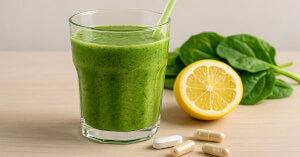
Bloating is one of the most common digestive complaints. It can make your stomach feel tight, swollen, or heavy after meals. While occasional bloating is normal, frequent discomfort can affect daily life. The good news is that certain supplements may help ease these symptoms and support healthier digestion.
Why Do We Get Bloating?
Bloating happens when excess gas builds up in the digestive tract or when the stomach empties too slowly. Common triggers include eating too quickly, high-fat or heavy meals, carbonated drinks, or mild food intolerances like lactose. Stress and gut bacteria imbalances can also play a role.
Best Supplements That May Help with Bloating
Digestive Enzymes
Digestive enzymes help your body break down food more efficiently. They support the digestion of proteins, fats, and carbohydrates, which can reduce the gas and heaviness that follow big meals. Enzyme blends are especially useful if you notice bloating after dairy or high-protein dishes.
📊 Clinical Evidence: Studies suggest that supplemental enzymes improve food breakdown and may reduce post-meal discomfort, especially in people with enzyme deficiencies or lactose intolerance.
✔️ Typical Dosage Range: 1–2 capsules taken just before or during meals, depending on the formula.
Probiotics
Probiotics are beneficial bacteria that help balance the gut microbiome. An unbalanced gut flora can lead to excess fermentation and gas. Adding the right probiotic strains may calm digestion and reduce bloating over time.
📊 Clinical Evidence: Research shows that strains like Lactobacillus and Bifidobacterium can reduce bloating in people with irritable bowel syndrome and other mild digestive issues.
✔️ Typical Dosage Range: 10–20 billion CFUs daily, taken with or without food depending on the product.
Peppermint Oil
Peppermint oil relaxes the muscles of the digestive tract, which can ease spasms and gas buildup. Enteric-coated capsules prevent the oil from releasing in the stomach, reducing the chance of heartburn.
📊 Clinical Evidence: Several trials have found peppermint oil capsules effective for relieving bloating and abdominal discomfort in people with irritable bowel syndrome.
✔️ Typical Dosage Range: 180–225 mg enteric-coated capsules, taken 2–3 times daily before meals.
Ginger
Ginger supports digestion by speeding up stomach emptying and reducing nausea. It is a gentle option for people who often feel heavy or bloated after eating.
📊 Clinical Evidence: Research shows ginger can improve gastric motility, which helps reduce bloating and discomfort after meals.
✔️ Typical Dosage Range: 500–1000 mg per day in capsule form, or 1–2 grams of dried ginger root in tea.
Fennel
Fennel has been used traditionally to reduce gas and digestive cramps. It is often found in herbal teas marketed for bloating relief and can also be taken as a capsule or extract.
📊 Clinical Evidence: Some studies suggest fennel seed extracts can ease abdominal discomfort and support smoother digestion, particularly in combination with other herbs.
✔️ Typical Dosage Range: 200–400 mg of fennel extract, or 1–2 teaspoons of seeds brewed as tea after meals.
Turmeric / Curcumin
Turmeric contains curcumin, which has mild anti-inflammatory effects and supports bile flow for better fat digestion. This can help ease heaviness and bloating after fatty meals.
📊 Clinical Evidence: Early studies show curcumin may reduce abdominal discomfort in people with functional digestive complaints, but more research is needed.
✔️ Typical Dosage Range: 500–1000 mg of standardized curcumin extract daily, often paired with black pepper for better absorption.
Magnesium (Citrate)
Magnesium citrate draws water into the intestines and helps keep bowel movements regular. This makes it especially useful if bloating is linked to occasional constipation.
📊 Clinical Evidence: Clinical use of magnesium citrate shows effectiveness in softening stools and supporting bowel regularity, which indirectly reduces bloating.
✔️ Typical Dosage Range: 200–400 mg daily, usually taken in the evening.
Activated Charcoal
Activated charcoal is a highly porous powder that can bind gas and other substances in the gut. It is more strongly supported for medical use in poisoning cases, but some people use it occasionally for bloating or gas relief.
📊 Clinical Evidence: Research supports activated charcoal in reducing toxin absorption during poisoning. Evidence for bloating relief is limited, with mixed results.
✔️ Typical Dosage Range: 500–1000 mg after meals, used occasionally. Avoid combining with medications or other supplements within 2 hours.
Lifestyle Tips Alongside Supplements
Supplements can help, but simple lifestyle habits also make a big difference for bloating:
- Eat slowly and chew food well to reduce swallowed air
- Limit carbonated drinks and artificial sweeteners
- Identify and reduce foods that trigger your symptoms, such as lactose or high-FODMAP foods
- Take a short walk after meals to stimulate digestion
FAQs: Supplements and Bloating
Can probiotics really reduce bloating?
Yes, certain probiotic strains have been shown to help rebalance gut bacteria and reduce gas, but results vary from person to person.
Is activated charcoal safe for everyday bloating?
It can be used occasionally, but it may interfere with nutrient and medication absorption. It is not recommended for long-term or daily use without medical advice.
What is the best supplement for bloating after big meals?
Digestive enzymes are often the most effective, as they help break down food quickly and reduce gas formation.
Can magnesium help with bloating?
Yes, magnesium citrate can help if your bloating is related to constipation, as it supports regular bowel movements.
This article was originally published on Stackbb, your trusted source for science-based supplement guides.












